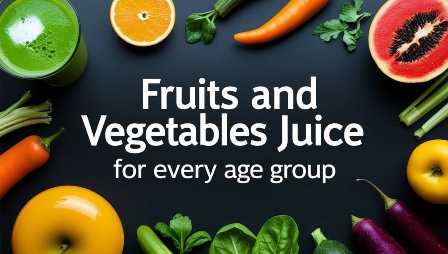[web_stories title=”true” excerpt=”false” author=”false” date=”false” archive_link=”true” archive_link_label=”” circle_size=”150″ sharp_corners=”false” image_alignment=”left” number_of_columns=”1″ number_of_stories=”5″ order=”DESC” view=”carousel” /]
[web_stories_embed url=”https://vitalityhealthworks.com/web-stories/10-powerful-natural-remedies-for-vibrant-health/” title=”Fruits and Vegetables Juice for Every Age Group” width=”360″ height=”600″ align=”none”]
Introduction:
In pursuit of a healthy body and increased energy levels, fruits and vegetables juice have long been considered a fantastic food supplement. Fruits and Vegetables Juice are a powerhouse of health benefits, transcending age barriers. Even amidst oral issues, consuming juices poses no discomfort.
Today, let’s delve into a world of Healthy fruits and vegetables juice and share insights from the National Center for Biotechnology Information’s published report, highlighting the surge in popularity of fruit and vegetable juices for health.
Which Fruits and Vegetables Juice Benefit Health?
Let’s explore essential questions about juices:
Pomegranate Juice:
Known for its diverse nutritional content, 240 ml of pomegranate juice, equivalent to about a cup, contains various nutrients vital for nourishment:
Calories, Protein, Carbs, Fiber, Sugar, Potassium, Vitamin C, Vitamin K.
Pomegranate juice also holds anthocyanins, benefiting bone health and overall well-being, earning its spot on the Healthy Fruits and Vegetables juices list.
Cabbage Juice:
Cabbage juice, rich in antioxidants, aids in cell repair due to its high antioxidant content. Its nutritional components include:
Vitamin C, Anthocyanins, Indoles, Soluble Fiber, Phytonutrients, Quercetin
These elements in cabbage juice contribute to potential health benefits when consumed regularly and in moderate amounts.
Apple Juice:
With a multitude of nutritional values, apple juice not only helps maintain a healthy body but also aids in relieving constipation. Noteworthy nutrients in apple juice include:
Fiber, Vitamin A, Vitamin C
Its pectin properties, as per the National Center for Biotechnology Information, enhance bowel activity, adding another reason to consider it a Healthy Juice.
Grape Juice:
For those seeking a nutritious elixir, grape juice might be the answer. Studies suggest its potential to mitigate various health issues, including eye-related problems, blood sugar, cholesterol, constipation, and blood pressure.
The nutrients present in grape juice include a spectrum of elements such as polyphenols, quercetin, catechin, and others, holding promise for health benefits when consumed in a balanced manner.
Orange Juice:
Included in the roster of nutritious juices, orange juice is praised for its skin and digestive system benefits. Its nutritional profile boasts elements like fiber, antioxidants, sodium, potassium, Vitamin C, iron, and Vitamin B6, contributing to potential health gains if consumed regularly in moderate amounts.
Top 10 Nutrient-Packed Juice Blends(Mixed Juices) for a Healthier You
1. Cucumber and Pear mixed juices:
This blend is a hydrating mix packed with Vitamin C and essential electrolytes. With nearly 90% water content, cucumber aids in hydration while pears offer their nutritional goodness. Combine two cucumbers, one pear, half a lemon, a cup of spinach, and fresh mint leaves for an anytime rejuvenation drink.
2. Watermelon and Lemon mixed juices:
Rich in water content, watermelon helps replenish hydration while lemons add Vitamin C and antioxidants. Blend two cups of diced watermelon, a lemon, and a few mint leaves for a refreshing morning drink.
3. Carrot and Tart Fruit Juice:
Carrots are a treasure trove of vitamins like A, C, and beta-carotene. Mix eight carrots with a tart fruit like orange or grapefruit for an antioxidant-packed juice, perfect to quench your thirst anytime during the day.
4. Carrot and Cherry mixed juices:
This blend provides ample nutrition and antioxidants from both carrots and cherries. Combine eight carrots with a cup of pitted cherries for a healthy snacking option at any time.
5. Strawberry and Watermelon mixed juices:
Watermelon’s hydrating properties combined with the Vitamin C in strawberries make this a superb solution for dehydration. Blend two cups of diced watermelon, a cup of strawberries, and a hint of rosemary for a light juice perfect for sipping or even as a meal supplement.
6. Parsley, Kale, and Apple mixed juices:
Parsley is a powerhouse of vitamins, while kale boasts fiber and omega-3 acids. Combine a bunch of parsley, three large kale leaves, three big apples, a cucumber, and two lemons for a nutritious potion.
7. Ginger and Carrot mixed juice:
Ginger aids digestion, and its combination with carrots is both delicious and nutritious. Mix an inch of fresh ginger, four carrots, and two oranges for a drink that’s both invigorating and beneficial, especially in the mornings.
8. Pineapple and Kale mixed juices:
Kale’s fiber and vitamins, combined with the sweetness of pineapple, make this a delightful and nutritious blend. Use five cups of kale, a cup of diced pineapple, a cucumber, and a lemon for sweet-tasting juice.
9. Mango, Pineapple, Orange, and Kale mixed juices:
The tangy zest of oranges combined with the sweetness of mango and pineapple, enriched with kale, makes this juice a powerhouse of nutrients. Blend a large mango, a cup of pineapple, half an orange, and three cups of kale for a delicious treat.
10. Ajwain, Ginger, and Apple mixed juices:
Ajwain (carom seeds) with ginger and apple is a blend rich in various vitamins and minerals. Mix eight leaves of ajwain, an inch of ginger, an apple, and a bunch of coriander leaves for a nutritious post-workout drink.
When is the Best Time to Consume Fruits and Vegetables juices?
While some tend to overindulge in beneficial food and drinks, it’s crucial to understand the optimal intake timings. Drinking fruits and vegetable juices can be done at any time, but consuming them in the morning on an empty stomach might yield added advantages. However, avoid consuming fruits and vegetables juices on an empty stomach to prevent abrupt spikes in blood sugar levels. Also, refrain from drinking juices before bedtime as they provide energy, and the body needs rest during sleep.
Fruits and Vegetables juice are fantastic for weight loss:
When it comes to balancing your weight loss diet, the recommendation of including fruits is commonly heard. However, few can precisely guide you on which fruits can aid in shedding those extra pounds.
Fruits offer satiety and are rich in fiber. Another benefit of consuming fruits is that they help deter unhealthy snacking tendencies and tame your cravings. If you’re tempted to indulge in unhealthy snacks, consider opting for a variety of fruits instead. For effective weight loss, it’s crucial to incorporate healthy, low-calorie foods into your routine.
Lemons: Known for aiding digestion and loaded with antioxidants, lemons help maintain a well-functioning metabolism. They contribute to fat burning and cleansing the body. Consuming lemons in detox water is especially beneficial.
Apples: Apples are rich in fiber and low in calories, which keeps you feeling satisfied. Several studies support the ability of apples to aid in weight loss.
Oranges: Oranges are a significant source of antioxidants, abundant in water and fiber, and packed with Vitamin C. A study by the University of Western Ontario found that compounds in sweet oranges and tangerines reversed pre-existing obesity in mice, reducing their fat cells’ size.
Tomatoes: Tomatoes are fantastic for weight loss as they are low in carbohydrates and packed with both soluble and insoluble fiber. They not only reduce bad cholesterol but also contain amino acids that help burn fat. Avoid ketchup and canned tomatoes.
Please note, that this content is for general information purposes only and is not a substitute for professional medical advice.
The Risks of Mixing Fruits and Vegetables Juices
The benefits of juices are widely known, but not everyone knows that experimenting with juices, especially mixing fruit and vegetable varieties, can prove harmful.
Why the Mix Might be Risky
Renowned nutritionist and researcher Michael T. Murray highlighted in a recent report that combining fruit and vegetable juices might not be advisable due to the differing digestive processes required for both. While research hasn’t definitively proven the superiority of mixed juices, it has unearthed potential issues faced by those consuming these blends. Gas-related problems, in particular, have emerged as a major concern.
Expert Recommendations:
1. Effects of Fruit-Vegetable Juice Blend
While juice consumption is beneficial for health, blindly consuming any juice can pose risks. Here, we detail the ten best juice blends that cater to health and energy.
2. Diabetes Patients Beware
Diabetes patients should exercise caution while consuming juices. Fruits and vegetables inherently contain sugar, making unsupervised juice intake potentially harmful. Advisably, diabetes patients should limit juice intake to not more than eight ounces at a time, favoring vegetable-based juices alongside meals for maximum benefits.
3. Kidney Stone Precaution
Research has indicated that individuals prone to kidney stones should refrain from consuming spinach-based juices as they tend to increase calcium and oxalate levels, contributing to stone formation. Instead, cranberry juice has shown potential in reducing the likelihood of kidney stones by about 50%.
4. Nutritional Balance with Juices
Juices, while rich in various nutrients, may lack certain essential components. It’s crucial to supplement juice intake with other nutritious foods to ensure adequate intake of high-quality proteins and healthy fats.
Nutritional Deficiency and Health Hazards
The repercussions of poor dietary habits in America are startling, leading to nearly seven million deaths annually. Insufficient nutrition poses a heightened risk of heart disease, diabetes, and cancer, with over two-thirds of American adults grappling with obesity due to inadequate nutrition.
Conclusion:
Juices undoubtedly offer health benefits, but understanding certain nuances is imperative. For specific queries or concerns regarding juice consumption related to health conditions, consulting a doctor is advisable.
Read More: 7 Days of Intermittent Fasting For Weight Loss
Read More: Start Your Day with Warm Lemon Water recipe
Read More: A combination of walking and jogging is a traditional act of life
Read More: The Science Behind High-Fat Low-Carb Diet: How It Reshapes Your Health
Read More: Vitamin D-rich foods vegan.
Read More: 10 Natural Remedies for Vibrant Health
Read More: Understanding the difference between stress and depression
Read More: The Science of Sexual Wellness: Balancing Mind, Body, and Passion


2 thoughts on “Fruits and Vegetables Juice for Every Age Group”